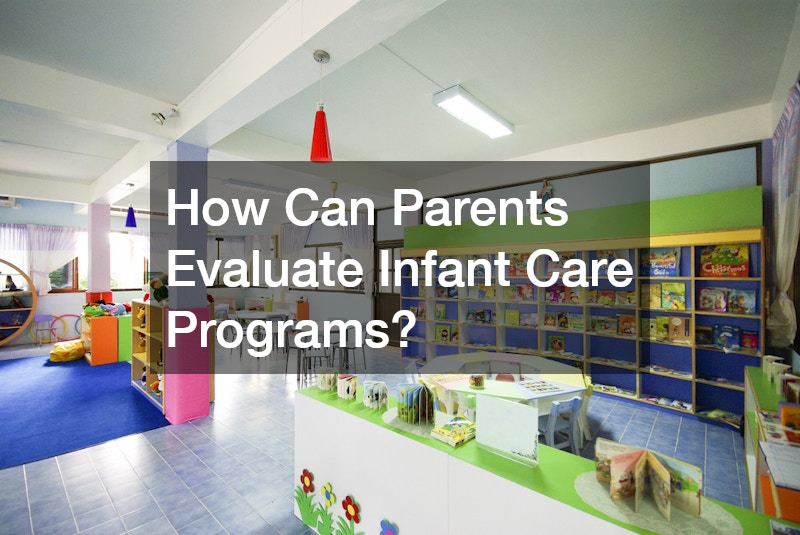Early childhood is a critical period in a child’s life, laying the foundation for future learning, behaviour, and overall well-being. Providing consistent routines and stimulating experiences during this time can have a lasting impact. For many families, infant care programs offer structured environments where young children can explore, learn, and grow under professional supervision. These programs are designed to support not only basic care needs but also the cognitive, social, and emotional development of infants.
Understanding how infant care programs contribute to early development can help parents make informed decisions about the best care options for their children.
What Role Do Infant Care Programs Play in Cognitive Development?
Cognitive development during infancy involves the growth of skills such as thinking, problem-solving, memory, and language. Infants benefit most when they are engaged in stimulating and consistent experiences. Infant care programs play a vital role in nurturing these abilities through carefully planned activities and interactions. Structured play, sensory exploration, and age-appropriate learning exercises are commonly incorporated into daily routines to stimulate curiosity and promote learning.
For example, infants might engage in activities that involve shapes, colours, and textures, helping them develop recognition and categorisation skills. Reading sessions and simple storytelling not only introduce language but also encourage listening skills and attention span. Even basic games like peek-a-boo or stacking blocks can enhance cognitive abilities, fostering early problem-solving skills and hand-eye coordination. By providing consistent, engaging experiences, infant care programs offer infants the stimulation necessary to reach important developmental milestones.
How Do Infant Care Programs Enhance Social and Emotional Growth?
While cognitive growth is essential, social and emotional development forms the bedrock of healthy relationships and emotional resilience. Early experiences with responsive adults help infants feel safe and understood. Infant care programs provide a safe, nurturing environment where children can form secure attachments with caregivers and peers. Consistent interaction with trained professionals helps infants learn to trust and respond to social cues, creating a foundation for future emotional regulation.
Participating in group activities also allows infants to develop basic social skills, such as sharing, turn-taking, and expressing emotions appropriately. Caregivers model empathy, patience, and communication, guiding infants in understanding and managing feelings. These early experiences are crucial, as infants who receive responsive, attentive care tend to develop higher self-confidence, stronger communication skills, and better adaptability in new situations. Through these programs, infants learn the building blocks of relationships that will support them well into childhood and beyond.
What Are the Key Features of Effective Infant Care Programs?
Not all infant care programs are created equal, and the features of high-quality programs directly influence developmental outcomes. Small, consistent groups allow children to build trust and feel secure. A strong infant care program typically maintains low child-to-staff ratios, allowing for personalised attention and responsive care. Staff qualifications are equally important, with caregivers trained in early childhood education, first aid, and child development principles.
Program structure is another critical factor. Daily schedules should balance active play, quiet time, meals, and rest periods, creating a predictable and secure environment. Effective programs also incorporate developmental assessments and ongoing communication with parents, ensuring that each child’s needs and milestones are closely monitored. Safety standards, cleanliness, and stimulating learning materials further contribute to a supportive environment where infants can thrive.
How Can Parents Evaluate Infant Care Programs?
Choosing the right infant care program can feel overwhelming, but there are several practical steps parents can take to make informed decisions. First, visiting the facility and observing daily routines can provide valuable insight into the program’s overall quality, staff interactions, and daily atmosphere. Asking about staff training, child-to-caregiver ratios, and curriculum details helps parents thoroughly assess whether the program meets recognised standards.
In addition, seeking feedback from other parents and reading program reviews can offer valuable perspectives and real-life insights. Parents should also consider their own child’s temperament, interests, and developmental needs when evaluating potential programs. By asking thoughtful questions and closely examining the environment, families can select an infant care program that not only meets basic care requirements but also actively supports early development and long-term growth.
Infant care programs play a pivotal role in fostering early childhood development, supporting cognitive growth, social skills, and emotional well-being. Through structured activities, responsive care, and safe environments, these programs provide the stimulation and nurturing necessary for infants to reach important developmental milestones. For parents, understanding the features of effective programs and taking steps to evaluate them carefully ensures that their child receives the highest quality care. As research continues to emphasise the long-term benefits of early intervention, the importance of high-quality infant care programs will only grow, offering children the best start in life.


